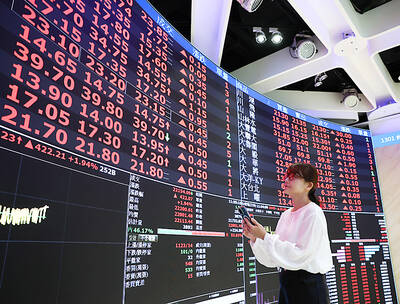Arkhouse Management Co and Brigade Capital Management LP boosted their offer for Macy’s Inc by 14 percent after the retailer rebuffed a previous proposal.
The investors are offering US$24 per share for the storied department-store operator, up from US$21 a share previously, they said in a statement on Sunday.
The new offer represents a 33 percent premium to Macy’s US$18.01 closing price on Friday last week.

Photo: AP
Macy’s shares rose 14 percent to US$20.48 in premarket trading yesterday morning. They had reached a high of as much as US$21.24 following the initial offer before retreating.
Macy’s in January rejected the earlier bid from the investor group, saying the offer lacked “compelling value.”
The company has instead unveiled a restructuring that includes plans to close almost one-third of its namesake US locations, while growing its Bloomingdale’s and Bluemercury brands.
However, Arkhouse, which nominated nine directors to Macy’s board last month, is persisting in its efforts. The investor group on Sunday disclosed that Fortress Investment Group LLC and One Investment Management US are equity partners in the proposed transaction.
“We are steadfast in our commitment to execute this transaction,” Arkhouse managing partners Gavriel Kahane and Jonathon Blackwell said in the statement. “We continue to offer the company an attractive alternative solution through a sale of the company at a substantial premium. This would provide Macy’s stockholders with significant value and immediate liquidity.”
Brigade touted its experience in the retail industry and the strength of its offer in a statement on Sunday, urging the board to “to proceed in good faith for the benefit of all stakeholders.”
Macy’s on Sunday confirmed it received the revised proposal, saying that it would “carefully review and evaluate” the offer.

UNCERTAINTIES: Exports surged 34.1% and private investment grew 7.03% to outpace expectations in the first half, although US tariffs could stall momentum The Chung-Hua Institution for Economic Research (CIER, 中華經濟研究院) yesterday raised its GDP growth forecast to 3.05 percent this year on a robust first-half performance, but warned that US tariff threats and external uncertainty could stall momentum in the second half of the year. “The first half proved exceptionally strong, allowing room for optimism,” CIER president Lien Hsien-ming (連賢明) said. “But the growth momentum may slow moving forward due to US tariffs.” The tariff threat poses definite downside risks, although the scale of the impact remains unclear given the unpredictability of US President Donald Trump’s policies, Lien said. Despite the headwinds, Taiwan is likely

READY TO BUY: Shortly after Nvidia announced the approval, Chinese firms scrambled to order the H20 GPUs, which the company must send to the US government for approval Nvidia Corp chief executive officer Jensen Huang (黃仁勳) late on Monday said the technology giant has won approval from US President Donald Trump’s administration to sell its advanced H20 graphics processing units (GPUs) used to develop artificial intelligence (AI) to China. The news came in a company blog post late on Monday and Huang also spoke about the coup on China’s state-run China Global Television Network in remarks shown on X. “The US government has assured Nvidia that licenses will be granted, and Nvidia hopes to start deliveries soon,” the post said. “Today, I’m announcing that the US government has approved for us

When Lika Megreladze was a child, life in her native western Georgian region of Guria revolved around tea. Her mother worked for decades as a scientist at the Soviet Union’s Institute of Tea and Subtropical Crops in the village of Anaseuli, Georgia, perfecting cultivation methods for a Georgian tea industry that supplied the bulk of the vast communist state’s brews. “When I was a child, this was only my mum’s workplace. Only later I realized that it was something big,” she said. Now, the institute lies abandoned. Yellowed papers are strewn around its decaying corridors, and a statue of Soviet founder Vladimir Lenin

The National Stabilization Fund (NSF, 國安基金) is to continue supporting local shares, as uncertainties in international politics and the economy could affect Taiwanese industries’ global deployment and corporate profits, as well as affect stock movement and investor confidence, the Ministry of Finance said in a statement yesterday. The NT$500 billion (US$17.1 billion) fund would remain active in the stock market as the US’ tariff measures have not yet been fully finalized, which would drive international capital flows and global supply chain restructuring, the ministry said after the a meeting of the fund’s steering committee. Along with ongoing geopolitical risks and an unfavorable